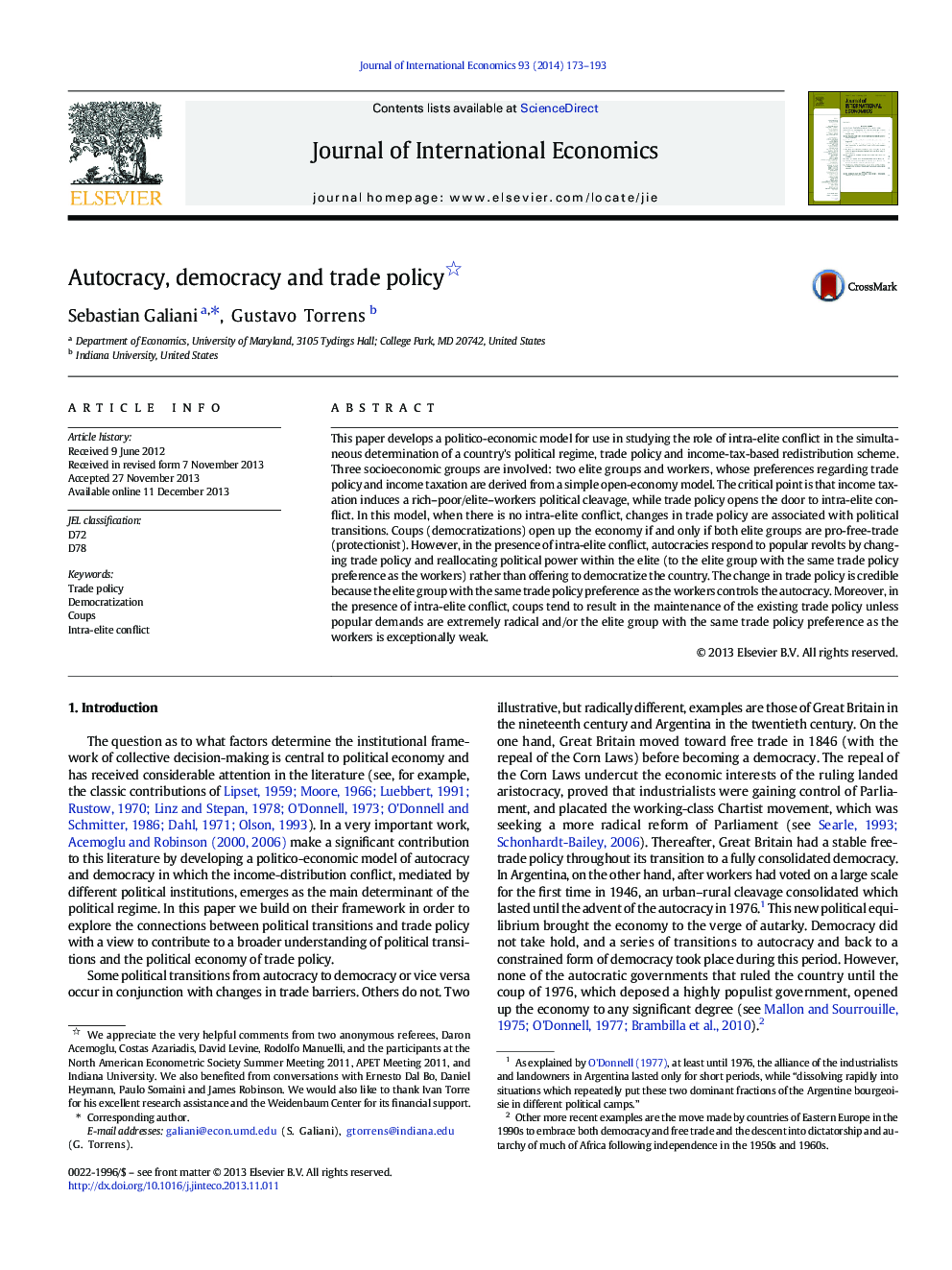| کد مقاله | کد نشریه | سال انتشار | مقاله انگلیسی | نسخه تمام متن |
|---|---|---|---|---|
| 10477000 | 930064 | 2014 | 21 صفحه PDF | دانلود رایگان |
عنوان انگلیسی مقاله ISI
Autocracy, democracy and trade policy
ترجمه فارسی عنوان
خودکامگی، دموکراسی و سیاست تجاری
دانلود مقاله + سفارش ترجمه
دانلود مقاله ISI انگلیسی
رایگان برای ایرانیان
ترجمه چکیده
این مقاله یک مدل سیاسی-اقتصادی برای استفاده در مطالعه نقش درگیری های درون نخبه در تعیین یک رژیم سیاسی سیاسی، سیاست تجاری و طرح توزیع مجدد درآمد بر اساس درآمد دارد. سه گروه اجتماعی-اقتصادی شامل: دو گروه نخبه و کارگران، که ترجیحات خود در رابطه با سیاست های تجاری و مالیات بر درآمد، از یک مدل اقتصاد آزاد باز است. نقطه بحرانی این است که مالیات بر درآمد باعث ایجاد شکاف سیاسی میان فقرا و نخبگان کارگری می شود، در حالیکه سیاست های تجاری در درگیری های درون نخبه به وجود می آید. در این مدل، زمانی که درگیری در درون نخبگان وجود ندارد، تغییرات در سیاست تجاری با گذار سیاسی همراه است. کوپا (دموکراتیزه کردن) اقتصاد را فقط در صورتی میبیند که هر دو گروه نخبه طرفدار تجارت آزاد (محافظتی) باشند. با این حال، با وجود درگیری درون نخبه، دولت های مستبد با تغییر سیاست های تجاری و تغییر مجدد قدرت سیاسی در نخبگان (به گروه نخبه با همان اولویت سیاست های تجاری به عنوان کارگران) به جای دادن دموکراتیزه کردن کشور، به شورش های مردمی پاسخ می دهند. تغییر در سیاست تجاری معتبر است، زیرا گروه نخبه با همان اولویت سیاست تجارت، به عنوان کارگران، خودکامگی را کنترل می کند. افزون بر این، در مواجهه با درگیری های درون نخبه، کودتاها منجر به حفظ سیاست های تجاری موجود می شود، مگر اینکه تقاضای مردم بسیار رادیکال و / یا گروه نخبه با همان اولویت تجارت است زیرا کارگران به شدت ضعیف هستند.
موضوعات مرتبط
علوم انسانی و اجتماعی
اقتصاد، اقتصادسنجی و امور مالی
اقتصاد و اقتصادسنجی
چکیده انگلیسی
This paper develops a politico-economic model for use in studying the role of intra-elite conflict in the simultaneous determination of a country's political regime, trade policy and income-tax-based redistribution scheme. Three socioeconomic groups are involved: two elite groups and workers, whose preferences regarding trade policy and income taxation are derived from a simple open-economy model. The critical point is that income taxation induces a rich-poor/elite-workers political cleavage, while trade policy opens the door to intra-elite conflict. In this model, when there is no intra-elite conflict, changes in trade policy are associated with political transitions. Coups (democratizations) open up the economy if and only if both elite groups are pro-free-trade (protectionist). However, in the presence of intra-elite conflict, autocracies respond to popular revolts by changing trade policy and reallocating political power within the elite (to the elite group with the same trade policy preference as the workers) rather than offering to democratize the country. The change in trade policy is credible because the elite group with the same trade policy preference as the workers controls the autocracy. Moreover, in the presence of intra-elite conflict, coups tend to result in the maintenance of the existing trade policy unless popular demands are extremely radical and/or the elite group with the same trade policy preference as the workers is exceptionally weak.
ناشر
Database: Elsevier - ScienceDirect (ساینس دایرکت)
Journal: Journal of International Economics - Volume 93, Issue 1, May 2014, Pages 173-193
Journal: Journal of International Economics - Volume 93, Issue 1, May 2014, Pages 173-193
نویسندگان
Sebastian Galiani, Gustavo Torrens,
